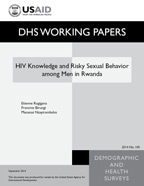- PUBLICATIONS
- JOURNAL ARTICLES
- ACCESS PUBLICATIONS
Publications Summary
- Document Type
- Working Papers
- Publication Topic(s)
- HIV/AIDS
- Country(s)
- Rwanda
- Language
- English
- Recommended Citation
- Rugigana, Etienne, Francine Birungi, and Manassé Nzayirambaho. 2014. HIV Knowledge and Risky Sexual Behavior among Men in Rwanda. DHS Working Papers No. 105. Rockville, Maryland, USA: ICF International.
- Download Citation
- RIS format / Text format / Endnote format
- Publication Date
- September 2014
- Publication ID
- WP105
Download
 HIV Knowledge and Risky Sexual Behavior among Men in Rwanda (PDF, 487K)
HIV Knowledge and Risky Sexual Behavior among Men in Rwanda (PDF, 487K)
